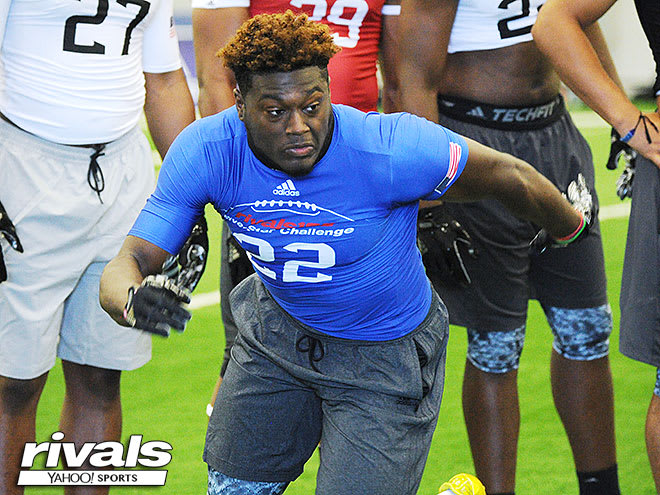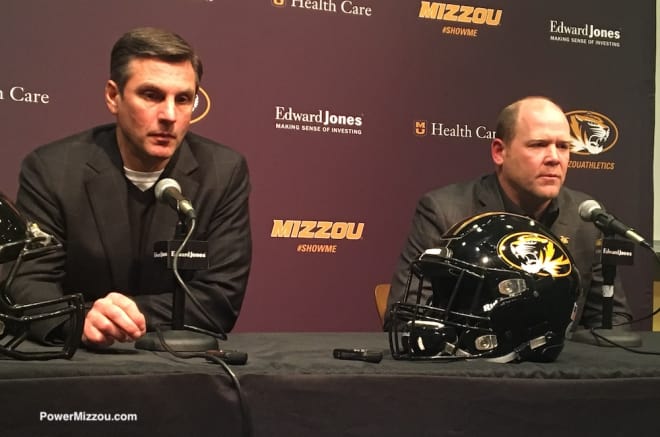In-state exodus the story of Signing Day
Let’s get the platitudes and generalities out of the way right off the bat, huh?
“We ended up with five guys from the state of Missouri,” Mizzou head coach Barry Odom said at his press conference on National Signing Day. “I’m really excited about the guys we got out of the state.”
Obviously. Every coach is. No coach signed anyone he doesn’t like and for every guy that ended up elsewhere there’s a reason.
That’s said. Now let’s get to the truth: For Missouri, this signing day was at least as much about the guys it didn’t get as the guys it did. The coaches will talk about the ones that are coming here for the next three to five years. But the fans and media have focused on all the players from the Show-Me State who are playing their college football elsewhere.
And that’s not going to stop.
This class was billed as the best in the state of Missouri in a quarter century. By media and fans and high school coaches and recruiting services, yes. But also by Missouri’s coaches. Odom and his assistants told everyone who would listen at the time how loaded the high school class was. They talked about needing to keep them all at home. In the end, the Tigers signed five in-state players (if you count juco products Harry Ballard III and Antar Thompson), but only one of the very-early-identified top ten in the state whom they hosted on an exclusive invite-only recruiting day last February.
“No,” long-time St. Louis recruiter Cornell Ford said when asked if he was satisfied with the in-state recruiting. “When you look at the numbers, you have to say there’s more work to be done.”
“When it came down to it, we have one guy of it,” Andy Hill, Missouri’s Kansas City presence, said. “We should be better than that. Our goal is to be better than that every year. You can’t say we have to get five or we have to get a certain number, but generally the better players we’ve had, historically, if you go down the all-American wall, they have been from the state of Missouri.”

The Tigers got Daniel Parker Jr., a defensive end out of Blue Springs. For those who don’t pay attention to recruiting year-round, here is the list of players the Tigers missed:
Kamryn Babb, Ohio State
Cameron Brown, Ohio State
Trevor Trout, USC
Daniel Carson, Texas
Ayodele Adeoye, Texas
Michael Thompson, Oklahoma
Dallas Craddieth, Iowa
Mario Goodrich, Clemson
Ronnie Perkins, Oklahoma
“For me I’d much rather be knocked for going all out and falling short than for being dismissive of the group, but there was obviously a very highly recruited group and there’s good football in this state and we wanted to continue to emphasize recruiting in this state, so when there’s good prospects you’re going to continue to roll out the red carpet and make sure that they know that you really want them at the university,” A.J. Ofodile, who spent the last cycle as Mizzou’s recruiting coordinator, said. “It’s the one time in their life that they get to make a selfish decision and I say that not in a negative way but a decision that’s all about them and what’s best for them. And you know the real negative thing would be to bring in kids that aren’t quite sure it’s the right fit.”
Missouri was beaten by an impressive list of schools. You’re talking about four of the top programs in college football history, one of the best two or three in recent years and Iowa, which has always recruited St. Louis well. Individually, there is perhaps no shame in losing any of them. And there are reasons for all of them. But the end result is the end result and, as Hill said, it’s not good enough.
“I think every good program who’s doing a good job in recruiting, they always start from a four, five, six hour radius from their home base,” offensive coordinator Derek Dooley said. “I don’t know anything really about the past as far as St. Louis and Kansas City, but there’s enough players in that four, five, six hour radius that we should get in there and roll up our sleeves and do what we can to show them why they should come to the home school. That’s our job as coaches.
“I know this: We need them a lot more than they need us.”

The why doesn’t matter. The fact is, Missouri batted .100 in state. Yes, they got the two junior college guys. And Dominic Gicinto and Bobby Lawrence signed too, but neither of those guys was identified early and neither of them had the competition the other did. Missouri wanted those ten guys a year ago. Nine of them went somewhere else. Oklahoma, Texas and Ohio State all signed more of the top ten than Missouri did.
“I want guys that want to be at the University of Missouri too. I feel very strongly about our program, the foundation that we’re on and the direction that we’re going," Odom said. “We’ve got work to do in every area. In-state, out of state, but also the commitment and the things we have done over the last few months and will continue to do, the brand of getting Mizzou kids to stay at Mizzou, we’re gonna get there.”
Odom may be right. He’s developed a reputation for passionate line-in-the-sand speeches. It's not like this is a new development for Missouri. When Gary Pinkel took over in 2000, relationships in the state were fractured. They didn’t get fixed right away—and maybe they didn’t get fixed permanently—but they improved greatly. Ford was here for that.
“Got to prove ourselves,” he said matter-of-factly. “This is relatively new people and we’ve got to do a good job of going out and selling our program and who we are and what we’re about. We’ll continue to do that. It’s a process. It didn’t happen overnight with coach Pinkel and it won’t with this staff. You have to prove yourself and that comes with trust, it takes time to do that and we’ll continue to do that.”
“I wasn’t really focusing on that when I went there,” Dooley said when asked about relationships on a recent trip to schools around the state. “I could care less about what happened prior. To me, every year you start over and keep sawing wood and try to develop relationships with the coaches.”
In all of the in-state analysis, the elephant in the room can’t be ignored. Hill didn’t. The biggest reason the Tigers were nearly shut out? They looked like a really bad football team for the first half of the season. So bad that the future of the coaching staff was completely up in the air.
“I think it hurt us being 1-and-5 and those guys thought, well, Missouri’s not really coming back and so those guys probably put their eyes somewhere else on different schools,” Hill said. “They’ve already committed and I don’t know the timing of all of them, could have made a difference maybe. Some other guys here committed late that we didn’t get. Truth be told, we’ve really got to focus on those guys and we’ve got to win football games. That will help all that.”
So the issues in the state can be bemoaned. They can be ignored. Often times, they can even be explained. But the solution? Just keep working.
“Our priority won’t ever change,” Ford said. “St. Louis, we started there last year, we’ll start there again this year. But in the end, you got to go get athletes. You always want to start in state, but if you don’t find them in state, you got to go other places. We will always start in state. That’s always going to be our mission.”
“I think it’s always important that you identify those guys that fit your program and fit what you want to be ,” Odom said. “And then hopefully you get it to match up. Just like in the state of Missouri, we’ve got work to do everywhere. I think the more we get guys on campus, the more we get them around this staff, it’s never going to be easy, but we’re going to make up a lot of ground.”
You keep working and you do the best you can. And if it doesn’t work, you find other solutions.
“You lump players in state as one unified group, but they all have singular mindsets,” Ofodile said. “They’re just so different across the board, and so to lump them as a collective and say there’s one way to recruit this collective, to me, is illogical. It doesn’t make sense. You recruit each individual prospect and do your best with trying to determine how to connect with them, how to present your university to them as best as possible.
“I think we have a pretty good system in terms of how we evaluate players and how we try to connect with them. Obviously we didn’t do as well as we would have liked to this year, but I think overall we did as well as we would have liked to as far as the players that we brought into our program and at the end of the day that’s what counts.”
And Missouri’s ultimate pitch? Raiders owner Al Davis said it best: Just win, baby.
“If we win the SEC East, it’s going to be a little bit easier to recruit a guy from in-state because they’ve heard,” Hill said. “We started off 1-and-5, they see that too. Hey, exposure’s good and exposure’s bad. And we need to win.”
